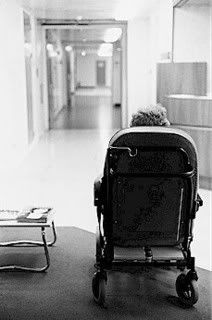My grandmother died last year. She passed away after an eight month stay in a nursing home, following a stroke that had taken her speech and much of her mobility. In the last months that she was alive, I witnessed my family scrambling to figure out what to do in case she would live that way for many years, while at the same time, hastily throwing together plans in preparation for her eventual death. In retrospect, much of the stress and disagreements that ensued might have been avoided if we had held a mediation session beforehand.

Before the stroke, my grandmother had also begun to exhibit symptoms of Alzheimer’s disease, and I watched as this once spunky woman became troubled by her increasing inability to remember the simplest of things. She had never had to rely on anyone, having been the one to take care of everyone else, and my grandfather found himself becoming more and more her caretaker as the time went by. For the three years we knew the diagnosis, there was no coordinated sit-down among the family members to determine her feelings about what was happening to her, nor were there any proactive decisions as to what the future might hold regarding her care, although the family did check in regularly and monitor her progress. It took something exigent before any firm action was taken, and at that point it became a tremendous dilemma to solve.
Due to advances in medicine, heightened attention to diet, and desire to maintain an active lifestyle, people are now living longer than ever. (My grandmother, at 87, was still walking several miles a day just prior to her unexpected stroke.) But, in the blink of an eye, our lives can drastically change, and it is imperative that our wishes are made known to the people around us, so that they aren’t left guessing what to do if a life-changing event should occur. Mediation is a growing field of alternative conflict resolution that allows families to come up with their own solutions to their problems. Both sides meet with a neutral third party, called a mediator, who helps them to focus and spell out their agreements in a document termed a Memorandum of Understanding (MOU). This document would be used in the future to execute necessary plans.
Elder mediation, in addition to a core mediator, often utilizes the services of trained professionals such as nurses and family therapists. Their presence helps to inform family members of options available and assists with the emotions that may arise. This collaborative environment, unlike an informal gathering at home where there may not be focus, allows for cooperative and deliberate decision-making, and, at the conclusion, ensures that delicate circumstances, should they occur in the future, will be handled with ease.
Whether you are an elder or the family of an elder, here are some of the things that are important to sort out through a mediation session:
- If you are an elder, do you have a specific view about the way things currently are, and possibly know things about which your child/children may not be aware? If you are the child of an elder, do you have specific concerns about the health/mental state of your parent that you feel you need to address?
- Are there any directives for a living will? If your life is being supported by a machine, is there a finite time period during which you would want to remain on that support? If you were to lose consciousness, do you want to be resuscitated?
- If you are currently sick, do you have a vision for your treatment, and are there options that you do not wish to consider under any circumstance?
- If you become incapacitated, what services would you need in order to live? Is there a desired nursing care facility you would want? Would you access private care? Would you move to the home of a child, sibling, or other friend/relative for care? Would you designate someone specific to make decisions for you on your behalf in the event that you were unable?
- Who is responsible for payment of essential services? Would a portion be paid by Medicare, private insurance, personal savings, or the savings of the children, siblings or other friend/relatives?
- If you should pass away, what are your wishes regarding funeral arrangements? Would you want to be buried, cremated, or possibly donated to science? It is crucial for those left behind to know now so that your desires may be followed.
Once an MOU is drafted, it can also be the starting point for legal documents such as a will or a living will; however, it is important to check the requirements for your specific state, either by investigating on your own or by obtaining the advice of an attorney, to make sure that all requirements are met to make your agreement legal and valid.
The time to devise solutions to the challenges you might face later in your life, or for the life of a loved one, is now. It is optimistic to think that families bond more strongly during times of crisis, but, unfortunately, chaotic events can often turn essential discussions into something contentious. Therefore, seize control of your destiny and make an appointment for mediation today.
Jennifer D. Grassini is the Executive Assistant for IADR - The Institute for Advanced Dispute Resolution (http://www.advanced-resolution.com/), a school which provides in-depth specialized training in mediation, including specific instruction in healthcare mediation techniques. IADR also offers mediation services for the community through their practicum program. She is passionate about the mediation process, and speaks to various groups regarding the benefits of alternative dispute resolution.
No comments:
Post a Comment